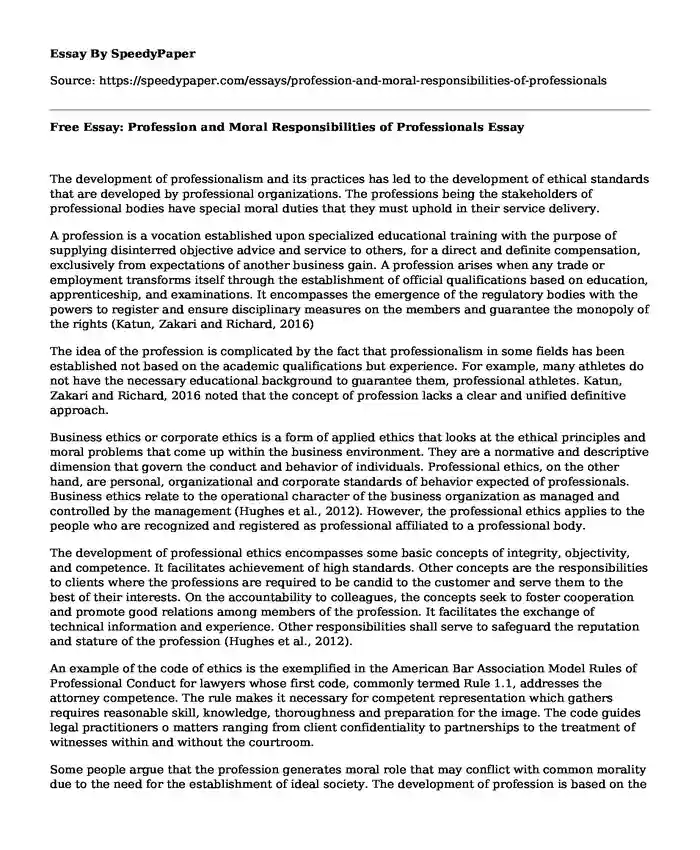
| Type of paper: | Essay |
| Categories: | Education Ethics Profession |
| Pages: | 3 |
| Wordcount: | 597 words |
The development of professionalism and its practices has led to the development of ethical standards that are developed by professional organizations. The professions being the stakeholders of professional bodies have special moral duties that they must uphold in their service delivery.
A profession is a vocation established upon specialized educational training with the purpose of supplying disinterred objective advice and service to others, for a direct and definite compensation, exclusively from expectations of another business gain. A profession arises when any trade or employment transforms itself through the establishment of official qualifications based on education, apprenticeship, and examinations. It encompasses the emergence of the regulatory bodies with the powers to register and ensure disciplinary measures on the members and guarantee the monopoly of the rights (Katun, Zakari and Richard, 2016)
The idea of the profession is complicated by the fact that professionalism in some fields has been established not based on the academic qualifications but experience. For example, many athletes do not have the necessary educational background to guarantee them, professional athletes. Katun, Zakari and Richard, 2016 noted that the concept of profession lacks a clear and unified definitive approach.
Business ethics or corporate ethics is a form of applied ethics that looks at the ethical principles and moral problems that come up within the business environment. They are a normative and descriptive dimension that govern the conduct and behavior of individuals. Professional ethics, on the other hand, are personal, organizational and corporate standards of behavior expected of professionals. Business ethics relate to the operational character of the business organization as managed and controlled by the management (Hughes et al., 2012). However, the professional ethics applies to the people who are recognized and registered as professional affiliated to a professional body.
The development of professional ethics encompasses some basic concepts of integrity, objectivity, and competence. It facilitates achievement of high standards. Other concepts are the responsibilities to clients where the professions are required to be candid to the customer and serve them to the best of their interests. On the accountability to colleagues, the concepts seek to foster cooperation and promote good relations among members of the profession. It facilitates the exchange of technical information and experience. Other responsibilities shall serve to safeguard the reputation and stature of the profession (Hughes et al., 2012).
An example of the code of ethics is the exemplified in the American Bar Association Model Rules of Professional Conduct for lawyers whose first code, commonly termed Rule 1.1, addresses the attorney competence. The rule makes it necessary for competent representation which gathers requires reasonable skill, knowledge, thoroughness and preparation for the image. The code guides legal practitioners o matters ranging from client confidentiality to partnerships to the treatment of witnesses within and without the courtroom.
Some people argue that the profession generates moral role that may conflict with common morality due to the need for the establishment of ideal society. The development of profession is based on the fact that there is a need for focus in a particular area. The professions develop rules that serve to protect their interests and the status of their work. I disagree that there is a difference between ethical duties of a profession as opposed to other occupations. The moral duties of a professional necessitate that the profession upholds to the professional ethics as he or she is a reflection of the profession.
References
Katun, M. I., Zakari, A., & Richard, K. A. (2016). Effect of Professional Ethics on
Construction Quality: Perception From Developing Country. Development, 4(2).
Hughes, R., Shrimpton, R., Recine, E., & Margetts, B. (2012). Empowering our profession. World Nutr, 3, 33-56.
Cite this page
Free Essay: Profession and Moral Responsibilities of Professionals. (2019, Sep 11). Retrieved from https://speedypaper.net/essays/profession-and-moral-responsibilities-of-professionals
Request Removal
If you are the original author of this essay and no longer wish to have it published on the SpeedyPaper website, please click below to request its removal:
- Knowledge Management and Change Management at Nestle. Free Essay.
- Free Essay: The Role PPM Tools Play in the Management of Growth for SMEs
- Education Essay Sample: Why Attending College Is Important
- Essay Example on Center for Disease Control
- Free Essay Example Dedicated to Jim Carrey
- Essay Sample Answering Why Hitler Lost World War Two
- A Change in the Management Style
Popular categories




